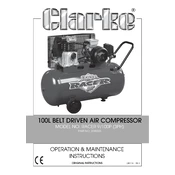Clarke 2245025 Racer 9 100p 3PH Air Instructions


Ensure the compressor is plugged into a suitable 3-phase power source. Check that the oil level is adequate and the pressure release valve is in the correct position. Turn the power switch to the 'On' position and allow the unit to build up pressure.
Check the power supply and ensure the compressor is properly connected. Inspect the fuse or circuit breaker and reset if necessary. Verify that the pressure switch is functioning correctly and that the unit is not overloaded.
It is recommended to change the oil every 500 operating hours or every three months, whichever comes first. Use the manufacturer's recommended oil type for optimal performance.
Regular maintenance includes checking the oil level, inspecting the air filter for cleanliness, examining hoses and connections for leaks, and ensuring the safety valves are operational.
Ensure the compressor is placed on a stable surface and consider installing vibration dampeners. Regular maintenance, such as tightening loose parts and ensuring proper lubrication, can also help reduce noise.
Turn off the compressor and allow it to cool. Check for proper ventilation around the unit and ensure the cooling fan is functioning. Inspect the oil level and air intake for blockages.
Locate the drain valve at the bottom of the air tank. Open the valve slowly to release accumulated moisture. Ensure the compressor is turned off and depressurized before performing this task.
Use a high-quality, non-detergent air compressor oil specifically designed for high-pressure units. Refer to the user manual for the manufacturer's specific oil recommendations.
Locate the pressure regulator knob and turn it clockwise to increase or counterclockwise to decrease the pressure. Monitor the pressure gauge to ensure the desired pressure setting is achieved.
Ensure the compressor oil is suitable for lower temperatures and allow the unit to warm up before use. Regularly check for moisture buildup in the air lines and drain the tank more frequently to prevent freezing.